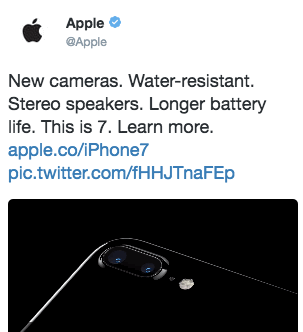The months and weeks leading up to the Apple iPhone event are littered with rumors and leaks. Screenshots of telling patents and renders and supposed photos of devices in the wild crop up with increasing frequency as the day nears. Sometimes they’re dead on, with no surprise come iPhone Day. Sometimes, they’re completely wrong and wither away at the first words of the announcement.
And then, sometimes — actually, just this time — Apple totally botches the reveal itself.
Being the mysterious company that it is, any word on product details set for an event are saved for — get this! — the event. But this year, Apple joined Twitter a few days before the event and failed to follow the internet edict of Never Tweeting. Moments into the show, Apple tweeted this:

Before the word “iPhone” had even been uttered, Apple confirmed the device’s new features, telling the world the water-resistant iPhone 7 will sport stereo speakers and better battery life. The lesson, as always: Never Tweet.
(Apple’s few tweets this morning are already gone, suggesting that Apple is a tweet deleter.)
To be fair, before the event, Amazon actually assisted in the botching by throwing up a splash page for new iPhone cases, revealing that there is indeed a dual camera and no headphone jack.
With at least an hour left in the event — the event specifically organized to present the launch of the iPhone 7 — we already knew Apple would announce dual cameras, the removal of the headphone jack, water-resistance, better battery life, and its September 16 availability.
So now here we all are, grumpily watching a livestream via Safari, listening to a variety of Apple updates waiting for … what exactly?
With one simple tweet, the surprise was ruined. The mystique Apple so meticulously constructs and protects was gone.
These “slips” reveal how unnecessary big stage announcements like this have become. When an iPhone announcement included a major step in technology — think the App Store or Siri — we needed a show like this to explain all the new capabilities we’d never used before, things that were entirely foreign to consumers. But because Apple — and the smartphone market in general — has taken such huge leaps in recent years, these comparably small steps don’t require an hour-long presentation, a tech press entirely dedicated to explaining its launch (yet, here I am!), or a fawning and oddly sexual Jony Ive mini-documentary about its design.
At this point, the iPhone is just another phone — a very, very good phone. Maybe the best phone. (I am, admittedly, very excited about the bokeh portrait effect.) But top-tier phones in general are more sophisticated now. There are already a slew of waterproof and water-resistant devices on the market, as well as phones boasting dual cameras. Apple may package all of these features together best (with the advantage of the App Store), but these are not new, foreign technologies requiring this level of explanation and fanfare.
“What is left for iPhone 7?” senior VP of Apple worldwide marketing Phil Schiller asked at one point during the presentation. A few things, for sure, but right now, it feels like there’s little that will leave us slack-jawed and standing in line for the device. And that’s fine. It speaks to how far Apple and its competitors have come. We flock to this event because that’s what we’ve always done, not because we expect a big surprise or a major leap forward in mobile technology. The pageantry of it all distracts everyone from the fact that there’s nothing particularly new about any of it.
So bring on the leaks and let the preemptive tweets and splash pages publish early. It doesn’t really matter anymore. Someday, it will again: Someone will get on a stage and reinvent the mobile market, leaving us awed and confused and excited — but a smartphone isn’t going to do it.
